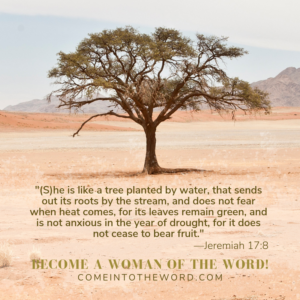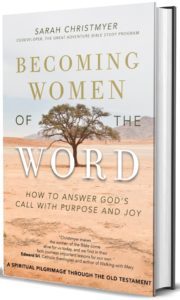Sarah Christmyer's Blog, page 12
September 20, 2019
GOD HAS CALLED YOU TO FRUITFULNESS—WHATEVER IT LOOKS LIKE NOW
 We rounded the corner of our house after being away for a while and gasped. Tire tracks churned through the yard. Piles of rocks and flagstones, uprooted from the old terrace, lay everywhere. The back yard was a rough sea of mud and debris. “My garden!” was all I could think. Everything from lilies to raspberries — gone! Who knew that building an addition would create so much collateral damage?
We rounded the corner of our house after being away for a while and gasped. Tire tracks churned through the yard. Piles of rocks and flagstones, uprooted from the old terrace, lay everywhere. The back yard was a rough sea of mud and debris. “My garden!” was all I could think. Everything from lilies to raspberries — gone! Who knew that building an addition would create so much collateral damage?
Looking out over that disaster of a yard gave me some (very small!) level of empathy as I read in the Bible about Israel when its enemies swept down and conquered them, carrying the people into exile. Much of the land was laid waste in the process. Israel was seen as the Lord’s own vineyard, which he had planted with choice vines in fertile soil (see Isaiah 5). Now, due to their sin, the land was ruined.
Our lives can feel like that sometimes, whether because of our own sin or the sins of others, or because we live in a fallen world. We go through times of upheaval and darkness. Times when we feel dry and barren or worse. At those times, hope in God! His plans don’t end in dust and dirt, even if sometimes our path goes through them. God is the master of bringing life from death, and he has called you to fruitfulness.
You did not choose me, but I chose you and appointed you
that you should go and bear fruit and that your fruit should abide. (John 15:16)

To Israel, the prophet Isaiah gave hope that God would heal their ravaged lives and make them fruitful:
In that day:
“A pleasant vineyard, sing of it!
I, the Lord, am its keeper;
every moment I water it.
Lest any one harm it,
I guard it night and day;
I have no wrath.
Would that I had thorns and briers to battle!
I would set out against them,
I would burn them up together.
Or let them lay hold of my protection,
let them make peace with me,
let them make peace with me.”
In days to come Jacob shall take root,
Israel shall blossom and put forth shoots,
and fill the whole world with fruit.
(Isaiah 27:2-6)
Thanks be to God who is my keeper, who has his eye on the vineyard of my life and wants me to bear fruit. Jesus, help me keep my eyes on You and off the mess around me!
© 2019 Sarah Christmyer
A similar version of this article appeared previously on the Women in the New Evangelization (WINE) blog.
You might also like:
NO PAIN NO GAIN? NO DEATH, NO LIFE (John 12:20-33)
LIFE IN THE VINE: Winter Pruning (thoughts on John 15)
ARE YOU BEARING FRUIT?
The post GOD HAS CALLED YOU TO FRUITFULNESS—WHATEVER IT LOOKS LIKE NOW appeared first on Come Into The Word with Sarah Christmyer | Bible Study | Lectio Divina | Journals | Retreat.
September 13, 2019
HOW WE CAN CARRY OUR CROSSES
Friday the 13th seems an appropriate day to be heading into Saturday’s Feast of the Exaltation of the Holy Cross. It brings to mind another Friday, the one that we call “good” — although it must have seemed anything but “good” to the disciples who witnessed it.
But here is the glory of the Cross: that when God became man, taking on flesh for the express purpose of entering this day and suffering that horrible death — it launched him into glory. The very worse thing the devil could do turned out to be not just ineffective; it was instrumental in lifting Jesus to power.
We adore you, O Christ, and we bless you, because by your holy Cross you have redeemed the world.

Photo by Zeus on Unsplash
It is the same for us.
Last Sunday, we heard these words of Jesus: “Whoever does not carry his own cross and come after me cannot be my disciple.” (Luke 14:27).
Crosses will come our way in life, but they need not defeat us. In Christ, we can pick them up and carry them. We can unite our suffering with his. We can carry our crosses knowing that if we have died with Christ (as we have in baptism), we will also live with him. As St. Paul wrote to the Romans, “For we know that Christ being raised from the dead will never die again; death no longer has dominion over him” (Rom 6:9). That same resurrection power assures us that suffering and death DO NOT have the final word.
We adore you, O Christ, and we bless you, because by your holy Cross you have redeemed the world.
Sit before the Cross today and behold the One who went before us. Look on his wounds. See his blood, that river of grace by which we, too, are saved and lifted up.
+ + + + + + +
I can’t think of a better passage to help me meditate on that than this one, Philippians 2:5-11—
Have this mind among yourselves, which was in Christ Jesus, who, though he was in the form of God, did not count equality with God a thing to be grasped, but emptied himself, taking the form of a servant, being born in the likeness of men. And being found in human form he humbled himself and became obedient unto death, even death on a cross. Therefore God has highly exalted him and bestowed on him the name which is above every name, that at the name of Jesus every knee should bow, in heaven and on earth and under the earth, and every tongue confess that Jesus Christ is Lord, to the glory of God the Father.
God bless you as you ponder his word!
© 2019 Sarah Christmyer
The post HOW WE CAN CARRY OUR CROSSES appeared first on Come Into The Word with Sarah Christmyer | Bible Study | Lectio Divina | Journals | Retreat.
August 23, 2019
ALWAYS LOOK OUT FOR NUMBER ONE (Who’s Number One?)
“Where you go I will go, and where you lodge I will lodge; your people shall be my people, and your God my God….” (Ruth 1:16)
These words have been sung at countless weddings – but they were first said not by a bride but by someone who turned her back on the sensible option for her own future, to help someone who had lost everything.

“Ruth and Naomi” by Ary Scheffer. Wikipedia Commons.
Ruth had lost her husband, to be sure. But her mother-in-law, Naomi, had lost nearly everything. She was living in a foreign country, had buried her husband and both sons, and had no means of support. She was too old for a new start and felt she’d failed her two daughters-in-law. When Naomi urged the girls to return to their families while she went back to Israel, Ruth refused. She left everything behind rather than care for herself.
As I point out in Becoming Women of the Word, “Ruth exemplifies the kind of love St. Paul described when he urged Christians to ‘do nothing from selfishness or conceit, but in humility count others better than yourselves. Let each of you look not only to his own interests, but also to the interests of others.’” (page 84).
Those words Paul wrote to the Philippians are worth spending time with:
“Do nothing from selfishness or conceit…”
It’s easy for me to think, when I read this, yeah yeah, I’m pretty good with that. But then that next line grabs me:
“… but in humility count others better than yourselves.”
What do other people have to do with my decisions? As long as I’m looking out for myself, isn’t that enough? Especially if they’re not affected by what I decide. Why shouldn’t I do what’s right for me?
When I meditate on this with Ruth’s story in mind, I see it from a new angle. Ruth would have been fully justified in going back to her parents. I suspect that was “the right thing” to do. It wasn’t selfish in a bad way at all. But in humility, she thought first of Naomi. By seeing Naomi’s greater need and laying aside her own agenda to help her mother-in-law, Ruth was “counting Naomi better” than herself.
“Let each of you look not only to his own interests, but also to the interests of others.”
Paul’s next words confirm that. When we spend all our time and efforts “looking out for #1” we fail to see other needs around us, that we might be uniquely suited to help with.
But what about me? I protest. Who will watch out for me?
The words of Jesus come to mind:
“Therefore do not be anxious, saying, ‘What shall we eat?’ or ‘What shall we drink?’ or ‘What shall we wear?’ For … your heavenly Father knows that you need them all. But seek first his kingdom and his righteousness, and all these things shall be yours as well” (Matthew 6:31-33, emphasis mine).
When we put ourselves second and others first, which is one way to seek God’s righteousness (not ours), we don’t have to worry because he’ll take care of us.
Paul puts Jesus out there as an example as he continues:
“Have this mind among yourselves…”
[what mind? The one that puts other people’s needs before our own]
“…which was in Christ Jesus,
who, though he was in the form of God,
did not count equality with God a thing to be grasped,
but emptied himself,
taking the form of a servant, being born in the likeness of men.
And being found in human form he humbled himself and became obedient unto death, even death on a cross” (Philippians 2:6-8).
That’s easy for you to say, I think. Paul is a saint! But why should I make myself last?
“Therefore God has highly exalted him….” (vs. 9)
Just as God exalted his Son for his humility, he will raise us up too. It’s what God does – and Ruth is a case in point. When she put Naomi first and continued to serve her needs, she met a good man who took care of both of them and she was grafted into Israel, into the lineage of Jesus.
It is from people like Ruth that Christ is born into the world, even today.
Spend some time in the book of Ruth (or in Philippians 2: the whole chapter is rich). Ask the Lord how you might put someone else first this week.
© 2019 Sarah Christmyer
To read more about Becoming Women of the Word: How to Answer God’s Call with Purpose and Joy, download the Introduction and Table of Contents here:
Becoming Women of the Word TOC and Introduction
You might also like:
Love: Always There for the Giving
A Mother’s Day Greeting from St. Paul
The ABC’s of Reading St. Paul
A Post-Summer Attitude Adjustment: Wisdom from Paul
The post ALWAYS LOOK OUT FOR NUMBER ONE (Who’s Number One?) appeared first on Come Into The Word with Sarah Christmyer | Bible Study | Lectio Divina | Journals | Retreat.
August 16, 2019
THE ABC’S OF READING ST. PAUL—and an example to encourage you
I wouldn’t call St. Paul the master of the tweet.
It would take three full tweets, in fact, to cover 2 Corinthians 1:3-5 — and that’s one of his shorter quotables. But it’s definitely worth sending out to your friends, if only they’ll pause long enough to take it in:
“Blessed be the God and Father of our Lord Jesus Christ, the Father of all compassion and God of all encouragement, who encourages us in our every affliction, so that we may be able to encourage those who are in any affliction with the encouragement with which we ourselves are encouraged by God. For as Christ’s sufferings overflow to us, so through Christ does our encouragement also overflow.” (NABRE)
Before you click on to something else, give me a minute to help you read it. I think you’ll be glad you did.
Here are the ABC’s of reading St. Paul:
A – Approach every sentence as though it’s a whole paragraph
B – Break it down into thoughts
C – Capture the meaning piece by piece
Let’s take that approach to 2 Corinthians 1:3-5. It doesn’t take much imagination to see it as a paragraph. Break it down thought by thought and read it to yourself (try it out loud) a line at a time:
Blessed be the God and Father of our Lord Jesus Christ,
the Father of all compassion
and God of all encouragement,
who encourages us in our every affliction,
so that
we may be able to encourage
those who are in any affliction
with the encouragement with which we ourselves are encouraged by God.
For as Christ’s sufferings overflow to us,
so through Christ does our encouragement also overflow.
Now let’s dive into the meaning. I’m going to take it in four parts — feel free to break it down further if you want:
1. Who God is
Blessed be the God and Father of our Lord Jesus Christ,
the Father of all compassion
and God of all encouragement,…
Paul starts by blessing God the Father of Jesus. Why? For being also “the Father of all compassion” and “the God of all encouragement.”
If you’re “the father of” something, you’re where that thing starts. You’re its source. So all compassion comes from God. Let that sink in. The God who Paul is speaking of is not the harsh, unfeeling, judgmental God who many fear; he is full of compassion. Therefore, he is also “God of all encouragement.” Some translations say “God of all comfort.” Either way, if compassion can be thought of as an attitude, encouragement and comfort put that attitude into action on our behalf. I get a picture of God looking out on us with fatherly love, seeking those who are in need.
Notice the “all” in both of these descriptions. All compassion. All encouragement. Even when we get them from other places, their ultimate source is in him (but more on that later).
2. What he does
…who encourages us in our every affliction,…
That godly encouragement (all of it) comes to us in every affliction. He must be paying close attention! There is nothing I might go through, that escapes him.
I note that encouragement is not the same as doing away with or solving. There are times when God allows affliction to remain, for reasons best known to himself. But if I am encouraged and comforted in that situation, I can almost forget the affliction or even be thankful in it because of his courage and comfort.
3. Why he does it
…so that…
Here’s the reason he takes such care:
…we may be able to encourage
those who are in any affliction
with the encouragement with which we ourselves are encouraged by God….
I was kind of expecting “so that we can bear it.” But instead, Paul points out that it’s not only for our sake that God encourages us, but also for the fruit borne in our lives that can be offered to others.
“Those who are in any affliction.” Not that I can necessarily solve their problems. But I can encourage and comfort people who don’t know God or who for whatever reason aren’t receiving the encouragement he offers, whatever they are going through, because God pours out so much on me, there is plenty to share.
4. How it works
…For as Christ’s sufferings overflow to us,
so through Christ does our encouragement also overflow.
This last verse goes deep. Here’s what strikes me right now: the movement from Christ to us of suffering, yes, and of encouragement but not just any encouragement, encouragement that overflows (not to but) through Christ. Where? It must be to others. This is what it is to be part of the Body of Christ. To be so intimately connected that we share not just in his suffering but in a consolation and encouragement that is so plentiful we can’t contain it. The sharing flows out of our brokenness, to others, through Christ. He reaches those others through me and through you.
We are his hands and feet, as the saying goes. We can be instruments of compassion if we don’t hoard to ourselves what he gives us.
I think of how often I’ve commiserated with others instead of sharing the encouragement I’ve received. Lord, help me not to stockpile your comfort, but let it overflow!
Back to Paul and his untweetable quotes.
Maybe you can post this verse, too long to tweet, as an image instead — along with 140 characters of how God has encouraged you. May your encouragement overflow!

Post your thoughts with #verseoftheweek – I’d love to read your encouraging words!
©2019 Sarah Christmyer
The post THE ABC’S OF READING ST. PAUL—and an example to encourage you appeared first on Come Into The Word with Sarah Christmyer | Bible Study | Lectio Divina | Journals | Retreat.
August 9, 2019
ARE YOU LISTENING? GOD WANTS TO SPEAK
I was five and we were vacationing on Lantau island. Today an airport crowns the Hong Kong mountain. Back then, it hosted scores of families seeking respite from the summer heat. The tiny cabins were separated from the main peak, where we took meals at a common dining room, by a “saddle”: a flat, grassy strip of land with steep slopes falling away to either side.
Normally, my brothers and I would run and play across the saddle, daring each other to get too close to the edge. But this particular day, a thick fog met us as we headed back from dinner. I stood still, isolated by the eerie whiteness, unable to see even my feet.

“Sarah!” My Dad’s voice reached me as his hand appeared, groping for mine. “Get down on your belly and hold my foot.” We half crawled, half snaked our way across the saddle in a human chain.
What I remember most was how having lost the use of my eyes, my ears strained for every sound. I could hear my brothers making their way behind me, my mother taking up the rear. Her words of encouragement and Dad’s quiet directions were as good as a path across that perilous strip. But I had to listen for all I was worth.
Listening at the Transfiguration
I can’t help remembering this as I read Luke’s account of the Transfiguration (9:28-36). Jesus takes Peter, John, and James up on a mountain to pray. Moses and Elijah appear and speak with him, and then as Peter tries to get them to stay, a cloud covers them all. “They were afraid as they entered the cloud,” verse 34 says. I can relate! “Then from the cloud came a voice that said, ‘This is my Son, my Chosen; listen to him!’” (vs. 35).
Listen to him! LISTEN. They would be straining their ears and all their attention in his direction. That word is for us, too. We need to listen for that “still small voice” (1 Kings 19:12) so we can follow.
Today we cannot see the invisible God but we can hear … and he still speaks.
What keeps us from truly listening?
• Without the fog that long-ago day, I might have run off with my brothers, chased a frog or hunted for snails … anything but listen to my parents until I had to.
—Are you ever tempted to go your own way, only paying attention to God if you’re in trouble?
• Peter, John, and James were distracted by Moses and Elijah until the cloud hid them from view.
—Are you ever tempted to follow other people (even good people), to hang on their words at the expense of listening to the Lord?
• In contrast, those same disciples “fell silent” when they were left alone with the Lord.
—Are you ever distracted by other noise in your life, from listening to Jesus? What will it take to find silence?
“Listen to him!”

The Lord speaks to us in Scripture, whether we hear it proclaimed at Mass or are reading in the privacy of our homes or are meditating on what we have learned. He speaks through events, he speaks through wise counselors. He speaks into our hearts as we pray.
How can you be truly present in order to hear? Pray and ask the Lord what you need to do to become a better hearer and doer of the Word.
Everyone who listens to these words of mine and acts on them will be like a wise man who built his house on rock.
—Matthew 7:24
Remember [God’s] life-giving words … and make them yours – so you can be a sentinel, showing signs to others, lighting their way.
—Pope Francis homily at the Easter Vigil, 3/26/2016.
Become a person of the Word!
© 2019 Sarah Christmyer
You might also like:
• God Wants to Speak to You: How to Hear Him
• Not by Bread Alone: How to Live by the Word of God
• Read the Bible Like A Disciple
• Build a Bible Reading Habit (3 “Ps” to Get You Started)
The post ARE YOU LISTENING? GOD WANTS TO SPEAK appeared first on Come Into The Word with Sarah Christmyer | Bible Study | Lectio Divina | Journals | Retreat.
August 1, 2019
NEW RELEASE! Becoming Women of the Word: How to Answer God’s Call With Purpose and Joy
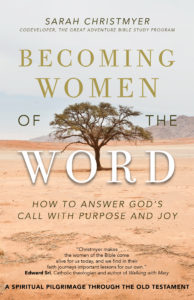 Have you ever wondered how to follow God and trust him, even when you don’t know where you’re going … or you feel inadequate … or you’re alone or your world is falling apart?
Have you ever wondered how to follow God and trust him, even when you don’t know where you’re going … or you feel inadequate … or you’re alone or your world is falling apart?
How do you DO that? How do you know you can trust God?
In Becoming Women of the Word: How to Answer God’s Call with Purpose and Joy, I enter the lives of some of the first people God ever reached out to — Eve and Sarah, Miriam, Ruth and Esther, to name a few — and walk alongside them to learn the secrets of their faith in God. In the process, I share stories from my own faith journey and the lives of other women I know.
All of them, the biblical and the modern women, are ordinary women who heard God’s word in tough times in their lives and learned to trust and follow. By their example, we can learn how to answer God’s call in our lives “with purpose and joy.”
Here are some answers to FAQs about the book:
Frequently Asked Questions
What is a “Woman of the Word”?
How can you “answer God’s call with purpose and joy”?
Where did the idea for Becoming Women of the Word come from?
Why is there a tree on the cover?
What is a “Woman of the Word”?
A woman (or a person) of the Word is one who has taken the word of God to heart so that it informs who she is and what she does and how.
A woman of the Word — like Mary, Mother of the Word — hears God’s word and receives it; she says “yes” to its call on her life. She ponders it (including what she doesn’t understand). She lets it take shape inside her and transform her until she “bears Christ to the world” in her actions.
How can we “answer God’s call with purpose and joy?”
You will need to read the book for a full answer. But as we learn from these women of the OT and as I was taught by the other women I have written about: To answer God’s call, you must first of all hear it! So – listen for God’s voice, really listen to what you hear. And then comes the hard part: to give your “yes” to what he asks. This is possible when we know God’s character and his love for us; when we know what he has done to demonstrate that love; and when we know his plan and promises. We find our purpose in his when we seek his guidance and follow, allowing him to grow and work in us.
Where did the idea for Becoming Women of the Word come from?
For years, I’ve been teaching people the overarching story of salvation history as it’s told in the Bible: particularly in the Old Testament, which Catholics are less familiar with. The first time I heard it, many years ago, I was captivated by the love and mercy of God not just for the Jews, but for me. I realized that their story is my story, too.
As we teach in the Great Adventure Bible Timeline program, that story unfolds in a series of covenant promises that God makes with Noah, Abraham, Moses, and David – all eventually leading to the New Covenant in Jesus Christ. Those great men of the Bible are incredible examples to us of what it means to have faith and be part of God’s family. But one day I realized, that while the focus is always on those men, nearly every one has a woman beside him. And she’s not just there for looks! Just like Mary isn’t just some woman who had a womb, that God used to be born in. The women of the Old Testament play a crucial role in forming the people of God.
I could go on all day about that, but this isn’t the place. Everyone knows that about the men. I wanted to look at the women, at what they show us about how to live by faith and about who we are as the people of God.
Why is there a tree on the cover?
I get asked this a lot! Why isn’t there a picture of a woman? That’s because even though I use the stories of women to get across the message, it’s the message that’s most important: that the people who are like this tree, whether they are men or women, are those who flourish with purpose and joy.
The tree is a picture of a person “of the Word.”
Read Psalm 1 or Jeremiah 17:7-8. And think about a tree in the desert. Unless its roots are plunged deep into the stream of God’s spirit: through meditating on Scripture “day and night,” as Psalm 1 says; through prayer and regular partaking of the Sacraments; through trust in the Lord alone, as Jeremiah says. Unless its roots are in that stream, it’s nothing but a tumbleweed tossed about by the wind.
You can be like the flourishing tree that’s on the cover. You can be in the desert of a dry spell, in a sandstorm, or your world falling apart: but if you are deeply rooted in the Word, in Prayer and the Sacraments – you’ll withstand the drought and flourish!
The women I wrote about teach us this truth.
Blessings on you as you dig deeper into his Word!
© 2019 Sarah Christmyer
Available now from Ave Maria Press, Amazon, and Barnes and Noble.
The post NEW RELEASE! Becoming Women of the Word: How to Answer God’s Call With Purpose and Joy appeared first on Come Into The Word with Sarah Christmyer | Bible Study | Lectio Divina | Journals | Retreat.
July 28, 2019
MOVIE NIGHT: A Lesson in Prayer from “Little Big Man”
Near the end of Little Big Man, the 1970 film with Dustin Hoffman, Faye Dunaway, and Chief Dan George, the aged medicine man—who has survived the massacre at Wounded Knee and seen victory at the Battle of Little Big Horn—prepares to die. On a high, lonely mountain he sings and dances before the god he calls “Grandfather” and he cries out this prayer:
It is a good day to die! Thank you for making me a Human Being! [as the Cheyenne called themselves]
Thank you for helpin’ me to become a warrior!
Thank you for my victories—
and for my defeats!
Thank you for my vision—
and the blindness in which I saw further!
You make all things and direct them in their ways, O Grandfather….

Chief Dan George as Old Lodge Skins in “Little Big Man” (1970)
When you listen to Old Lodge Skins give thanks for defeat, knowing how brutal and treacherous that defeat was; when you hear his thanks for blindness at the hands of the enemy; it’s startling. But your outrage dissolves, with his, in trust in divine providence.
It’s too bad the movie sums up Christianity in the person of a pious but hypocritical, sexually frustrated woman (Dunaway) who has nothing of spiritual value to offer and is only (somewhat) likable when she turns to prostitution. Because the truth is, the spirit of thanksgiving and the trust in God’s loving plan shown by Old Lodge Skins are central to the Christian faith. And forgiving the unspeakable violence and betrayal pictured in the film is possible only by the grace of the Holy Spirit and Christ’s death on the Cross.
Today, let’s learn a lesson from Old Lodge Skins. Set aside your grievances, forgive those who have done you wrong, and above all, in whatever circumstances you find yourself, give thanks.
You might meditate on Scripture to bring the lesson home further and to give you strength and help if you need it. The Old Testament story of Joseph and the brothers who betrayed him (Genesis 37-50) is a rich source of food for meditation, ending with this profound truth:
As for you, you meant evil against me; but God meant it for good, to bring it about that many people should be kept alive, as they are today. (Genesis 50:20)
St. Paul has much of comfort to say on the subject, including these words:
See that none of you repays evil for evil, but always seek to do good to one another and to all. Rejoice always, pray constantly, give thanks in all circumstances; for this is the will of God in Christ Jesus for you. (1 Thessalonians 5:15-18)
and these:
Have no anxiety about anything, but in everything by prayer and supplication with thanksgiving let your requests be made known to God. And the peace of God, which passes all understanding, will keep your hearts and your minds in Christ Jesus (Philippians 4:6-7)
Blessings on you as you “come into the Word”! And as you meditate on his truth, “may the God of hope fill you with all joy and peace in believing” (Romans 15:13).
© 2019 Sarah Christmyer
+ + + + + + +
The Scripture in this post is taken from the Revised Standard Version Catholic Edition (RSVCE). The Revised Standard Version of the Bible: Catholic Edition, copyright © 1965, 1966 the Division of Christian Education of the National Council of the Churches of Christ in the United States of America. Used by permission. All rights reserved.
+ + + + + + +
You might also like:
Giving Thanks in Good Times and in Bad
Forgiveness: What It Is and How to Do It
 Lord, Make Haste to Help Me! Seven Psalms to Pray in Times of Need
Lord, Make Haste to Help Me! Seven Psalms to Pray in Times of Need
This prayer journal will walk you through meditating on seven of my go-to psalms that I pray when I’m lost, hurting, overwhelmed—you name it. Something about praying with the psalms helps to take your mind off the pain and set it on God where our help is.
Available from Amazon.com.
The post MOVIE NIGHT: A Lesson in Prayer from “Little Big Man” appeared first on Come Into The Word with Sarah Christmyer | Bible Study | Lectio Divina | Journals | Retreat.
July 20, 2019
TRUST GOD, THE DIVINE ARTIST
The artist stands a full hour in the clearing, staring at the aspen trees. Her keen eyes trace the form of the trunks, feeling the way they curve back from the center; she explores the knots and crevasses, memorizing the patterns and colors of the bark. Later, she will sketch the tree from memory, then paint it as though she is creating life. She’ll lay the form down first, then stroke the bark on like skin. Every characteristic of the tree, even the black fissures and scars, will contribute to the beauty of the trunk. Some branches she will soften up with leaves while others will be left to write a message stark across the sky . . . .

Aspen grove, Chama, NM. Photo by Sarah Christmyer
Days or even months can go into a painting before the artist picks up a brush, while it takes shape in her heart and mind. I think of this as I read Psalm 33:11 (Revised Grail translation) —
The designs of the Lord … are from age to age.
He’s been thinking about us forever! That’s part of one of my favorite psalms. It continues like this:
From the heavens the Lord looks forth;
he sees all the children of men….
he who shapes the hearts of them all…. (vss. 13,15)
Think about that: the Lord of the Universe not only thought of us in advance, he makes the effort to look down from heaven at each one of us, considering us as individuals, even planning who we will be and tending us as we grow.
Wait: God made me . . . like this?
Sometimes I look at myself and see my flaws and I think God, what were you thinking? Why did you make me like this?
Then I remember I’m a work in progress and that God, like that artist, knows how to incorporate the flaws and hurts that sin (mine and the results of the Fall) uses to mar and wrinkle me, into a thing of beauty.
He makes everything beautiful in its time (Ecclesiastes 3:11).
It helps me to look at that aspen bark. Those dark spots and lines turn it from boring to beautiful.

Photo by ericdeluca from Pixabay.com.
Aspen bark is sensitive, which helps it get all it can from the sun when its leaves are gone … but which also means it shows its wounds. It gets dark lines and fissures with age, and wrinkles form around damaged bits and branches as it grows. Some artists smooth them out to pristine limbs but to my eye, the most beautiful paintings are the ones that show the scars and wrinkles.
God sees your true beauty
Here’s the thing to remember, when we’re tempted to paint perfect pictures for social media and hide our flaws and weaknesses in shame: God looks at us with our scars and wrinkles the way the artist views those aspen trees: with love and a desire to bring out of them their true beauty. I’ll say it again:
He makes everything beautiful in its time.
Here’s the psalmist again—this time in Psalm 139:1-3, 13-4, 17—extolling God’s personal care for us:
O LORD, you search me and you know me.
You yourself know my resting and my rising;
you discern my thoughts from afar.
You mark when I walk or lie down;
you know all my ways through and through. […]
For it was you who formed my inmost being,
knit me together in my mother’s womb.
I thank you who wonderfully made me;
how wonderful are your works,
which my soul knows well!
[…]
To me how precious your thoughts, O God;
how great is the sum of them!
If you feel less than precious today, take time to meditate on Psalm 33 or 139. Fill your soul with God’s love, with the certainty of how much he cares for you.
May your merciful love be upon us,
as we hope in you, O LORD. (Psalm 33:22)
© Sarah Christmyer 2019
The Revised Grail Psalter is the new English version of the Psalms approved for liturgical use. I recommend them for personal prayer as well! There’s a lovely poetic quality about them. You can read them online at the links I included above, and you can get them in book form here.
The Revised Grail Psalms Copyright © 2010, Conception Abbey/The Grail, admin. by GIA Publications, Inc., www.giamusic.com All rights reserved.
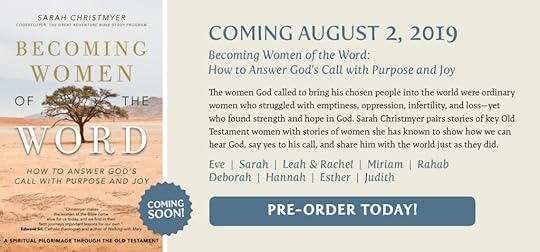
The post TRUST GOD, THE DIVINE ARTIST appeared first on Come Into The Word with Sarah Christmyer | Bible Study | Lectio Divina | Journals | Retreat.
June 16, 2019
PUZZLING OUT THE TRINITY: What does it mean to me?
Father. Son. Holy Spirit. Why does it matter that God is three-in-One? Why do we celebrate this day?
It doesn’t help me to think about a three-leaf clover, or of H20 as water, ice and steam. I still can’t wrap my head around it. I want to know first why it matters to my life. So I start with what it means to me:
God is Father
God is Father. Not only our father but MY father, personally, responsible for my being here. As his child I am somehow like him. He is everything that a father should be: Wise. Strong. Faithful. Patient. Trustworthy. Someone who teaches me right from wrong. Who loves me more than life, for who I am and in spite of my faults and failures. Who goes to bat for me against those who do me wrong. Who wants the best for me and works to help me get there.
Not only that, he is in heaven. Up above everyone else, seeing everything, knowing everything, and ruling everything from a place of goodness and holiness and love. That he’s up there means he’s above and greater than anything on earth. He has the final word against evil and pain.

The Trinity with Christ Crucified. Austrian. c. 1410.
God is Son
At the same time, God is Son. He’s everything I said above, but packaged in someone like you and me; packed into a brother and forever spouse. He’s in heaven now, but he was here on earth. He is someone to walk beside me on the journey, to show the way forward and out of the woods. Someone who put all that love God has for me into practice; put his life on the line and died so I could live — so I can make it in this difficult life. Thank God, God made him judge: because he knows and feels the pain of my weakness. He gets me. He pleads with God to forgive me, to wash away the messes that I make. He loves me to the death.
God is Holy Spirit
It might be hard to connect to that man who once was here but now is not. But God is also Holy Spirit. All of that love and grace and strength and character that is the essence of the Father and the Son, he poured out on us. The Spirit doesn’t just live above me in heaven, or walk beside me in life, the Spirit lives IN me. The Spirit gives me that life so I can be more like the One in whose image I was made. I don’t have to go elsewhere, God is always with me and in me with supernatural guidance and love, joy, peace, patience, kindness, self-control . . . all the things I don’t have on my own. The Spirit prays in me, helps me connect even when I can’t put thoughts into words of my own. With this life of the Spirit, I can actually become more like the Son, to the glory of the Father.
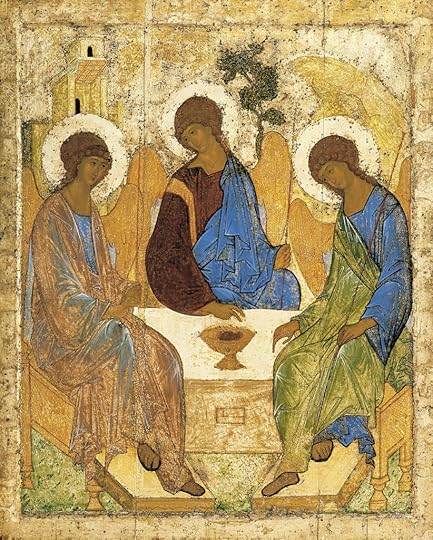
“Angels at Mamre” – Andrei Rublev’s famous Trinity icon, portraying the appearance of the LORD to Abraham in Genesis 18. (1410)
God is all those things in One
That Father—Son—Holy Spirit come wrapped in a single package (or more to the point, are ONE in essence, in nature, in purpose) has got to be a gift. I don’t get the “how,” but is it not a great thing? The one who is in heaven is also beside me and in me, helping me to be like him. It blows my mind. In the end, I find I grow to know God not by wrapping my mind around him but by allowing him into me. Through the Sacraments and through his Word and prayer. By being present to him as he is to me; by receiving and returning love; by listening and following.
My need to understand dissolves in the relationship. The puzzlement dissolves in love.
Glory be to the Father, to the Son, and to the Holy Spirit. Who was in the beginning, is now and ever shall be, world without end Amen.
Happy Feast Day of the Most Holy Trinity!
© 2019 Sarah Christmyer
An Act of Praise to the Most Holy Trinity
I praise you, Father all-powerful.
I praise you, Divine Son, our Lord and Savior.
I praise you, Spirit of Love and Consolation.
One God, three Persons, Triune Unity,
be near me in the temple of my soul.
Draw me to share in your life and love,
in your kindness
grant to me and to my family
the riches of your mercy,
and a share in your blessing,
that we may come to the glory of your Kingdom
and rejoice in loving you for all eternity. Amen.
The post PUZZLING OUT THE TRINITY: What does it mean to me? appeared first on Come Into The Word with Sarah Christmyer | Bible Study | Lectio Divina | Journals | Retreat.
June 1, 2019
A WINDOW INTO HEAVEN & THE COMMUNION OF SAINTS
It’s one thing to know something in your head. It’s quite another to feel it in your bones.
I had that experience recently in St. Peter’s Square in Rome. Dr. Edward Sri, who led our pilgrimage, had told us in advance what to expect: the grand central basilica, built over the graves of early Christians; the long colonnades stretched out like arms to embrace the pilgrims gathered in the Square; and above it all, as though looking down from heaven, a festal gathering of apostles, saints, and martyrs—all the Church represented, all together in one place.
“Nice thought,” I told myself. And then I went there and was enveloped by their presence.

It helped that I had a few hours to take it all in. We were seated front and center before the steps to the basilica, just some of the thousands of people waiting for Pope Francis to arrive and give his Wednesday audience. It was a fresh, bright, joy-filled morning. I was almost directly below the statue of St Peter, who in spite of having his hands full of keys and a scroll, looked down with a smile of kindly welcome.

Saints and martyrs waited with us, singly and grouped in pairs on their high perch. They stood relaxed together, seemingly chatting and observing us below them. Ditto for those who crowned St. Peter’s: Jesus, central with his cross, and the apostles – many of them holding the instruments of their martyrdom. There was a day when I would have thought that gruesome. But seeing them hold such awful things so lightly: it was as if they were saying to us, “Don’t be afraid! Not even torture and death can keep you from this wonderful life Jesus won for us!”
The opening words of Hebrews 12 came to mind:
Therefore, since we are surrounded by so great a cloud of witnesses, let us also lay aside every weight, and sin which clings so closely, and let us run with endurance the race that is set before us, looking to Jesus, the founder and perfecter of our faith, who for the joy that was set before him endured the cross, despising the shame, and is seated at the right hand of the throne of God. (Heb 12:1-2)
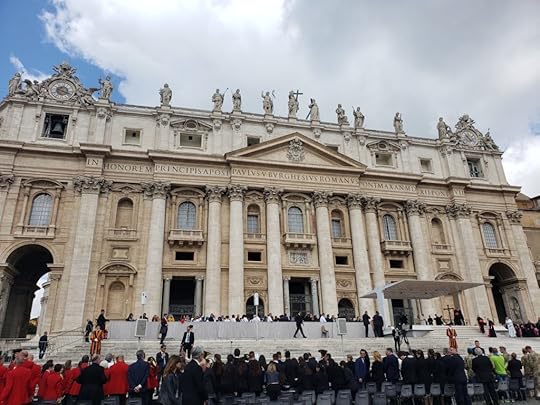
It’s worth spending time with that verse, taking it apart piece by piece and meditating on each phrase. In light of the “cloud of witnesses” I met in St. Peter’s Square, these things stand out:
• The weight that holds us back is not the weight of persecution, or even death. Look at the saints! The crosses, blades and spikes they so lightly bear have proved ineffective. It makes me think: what cross do I bear today? What ridicule or persecution aims to silence me and turn me from the road to heaven? These witnesses are living proof that if we let go of true weights like sin, fasten our eyes on Christ and keep moving ahead, our cross will not be heavy.
• In that last sentence, I did mean to write living proof (without quotes) — not “living” proof. The life of the saints is not metaphorical, even if we can’t see them. The pristine aspect of these figures in St. Peter’s, the peaceful ease and joy with which they seemed to share those hours with us, is as close as art can get to revealing the cloud of witnesses that surrounds us. Like bystanders at a race, they cheer us on and lend us courage.
• Jesus is “seated at the right hand of the throne of God” not to condemn us, but to save us. Before he died, he told his disciples that “if I go and prepare a place for you, I will come back again and take you to myself, so that where I am you also may be.”
It wasn’t enough for Jesus to defeat death for himself. He had to go up to heaven, throw open the doors and then call us to be with him there. In the meantime, the eyes of our hearts strain upward (like our eyes did in St. Peter’s Square). As Hans Urs von Balthasar wrote in The Three-Fold Garland: The World’s Salvation, when our heavenly home is “seen from below, a distance is created which awakens and intensifies our yearning: but this distance is one that is lived in God — spent in believing, hoping, and loving — so that it is an intensification of the divine life in those that remain behind….”
Come, Lord Jesus!
© Sarah Christmyer 2019
Feast of the Ascension
+ + + + + + +
Praise for Becoming Women of the Word
“Becoming Women of the Word offers a unique blend of personal testimony, salvation history, and study of the biblical text. … This an excellent example of how Bible study should lead us to reflect on our own experience … and then to praise and thank the Lord.”
—Sr. Sara Butler, MSBT, PhD, STL, Professor Emerita of Dogmatic Theology, University of St. Mary of the Lake, Mundelein, IL
+ + + + + + +
Available from Ave Maria Press, Amazon, Barnes & Noble, and Target
The post A WINDOW INTO HEAVEN & THE COMMUNION OF SAINTS appeared first on Come Into The Word with Sarah Christmyer | Bible Study | Lectio Divina | Journals | Retreat.


